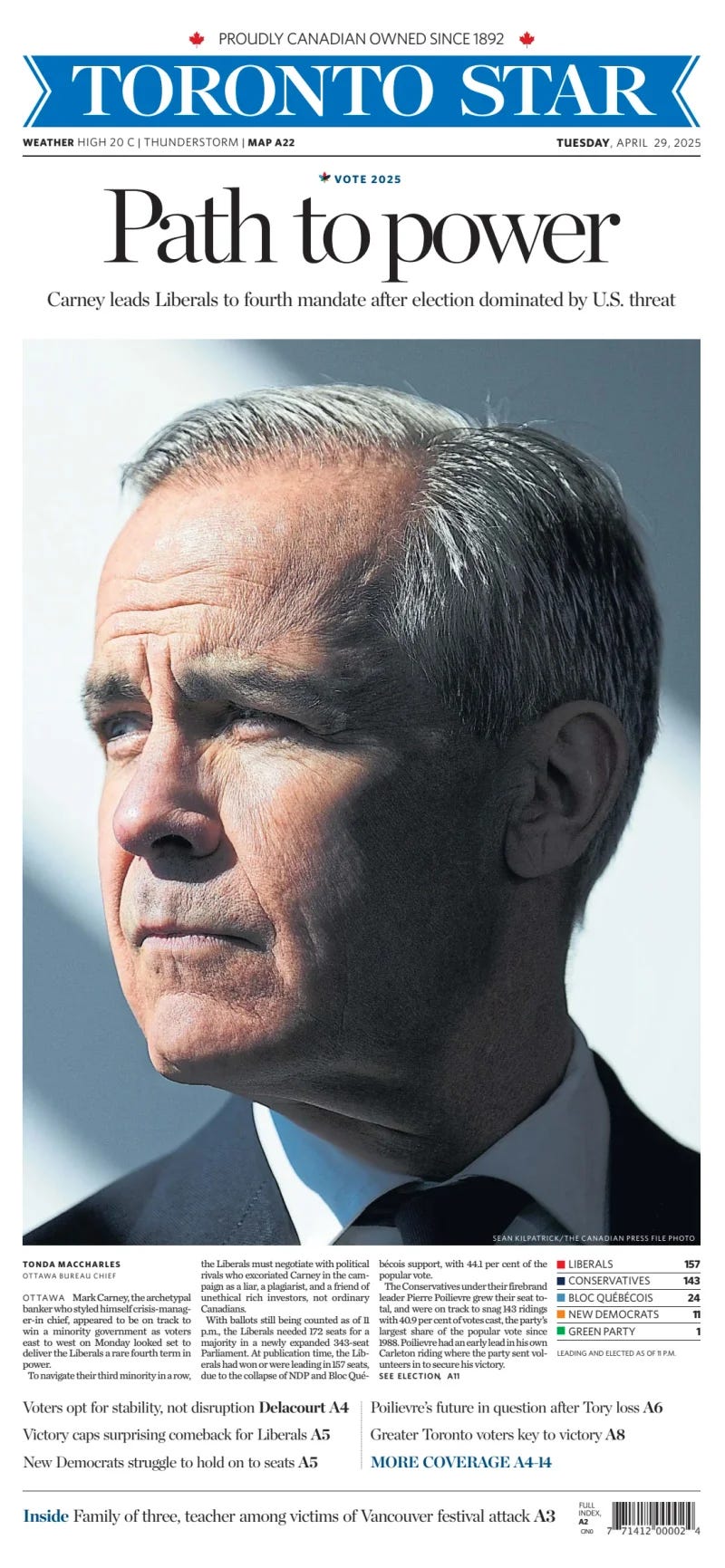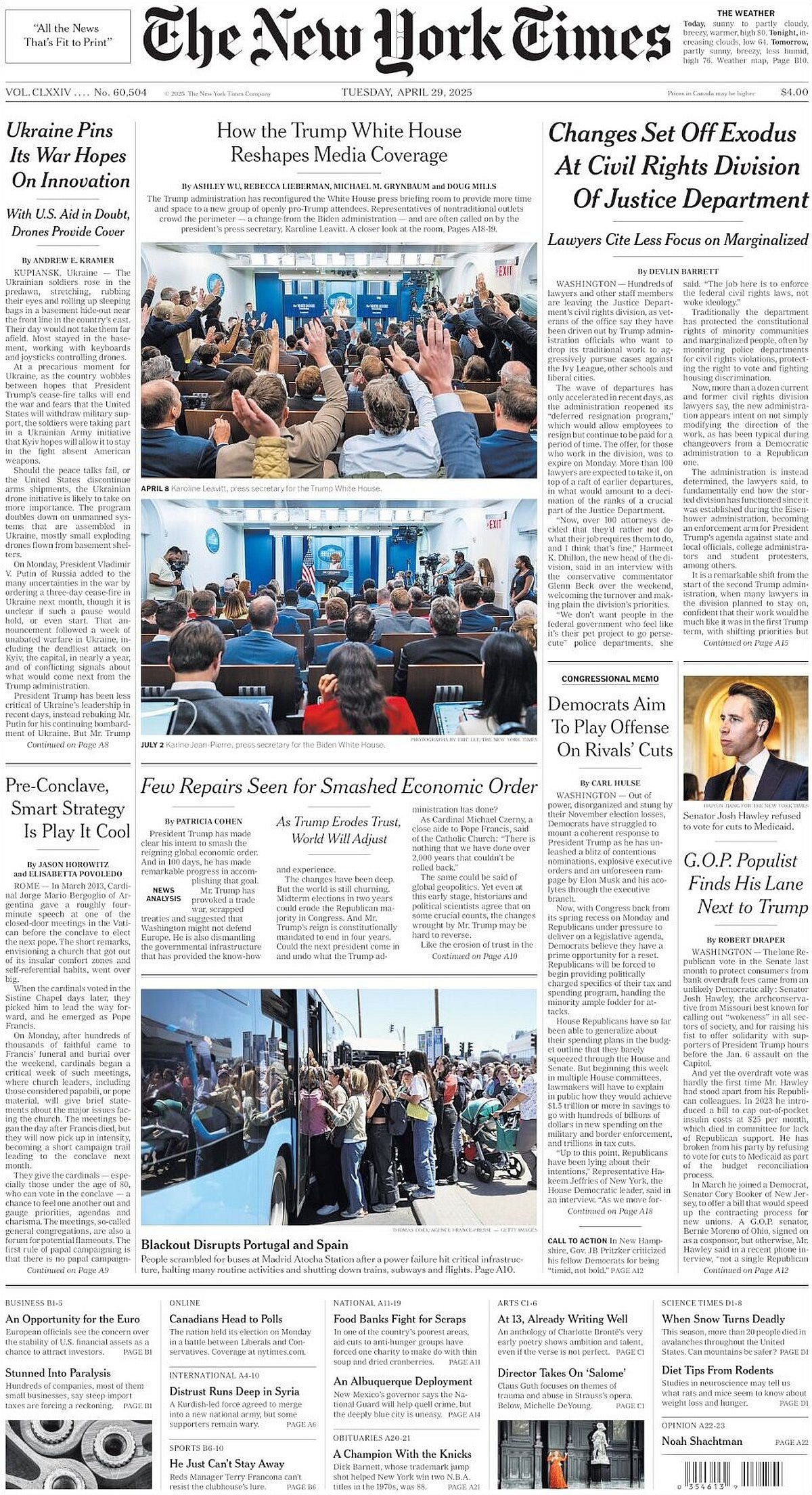Elbows Up: Canada Rejects Trumpism in Historic Vote
Canada Votes for Caution—and Carney
Mark Carney’s Liberal party has secured a win in Canada - however the party will return to Parliament with a minority. Conservative Leader Pierre Poilievre lost the seat he held for nearly two decades. Jagmeet Singh will step down from his post as NDP leader. Those were just some of the headlines that emerged from last night’s general election that capped a campaign shaped by complex global political headwinds, eroded Canada-U.S. relations and cost-of-living concerns at home. As prime minister, Carney will have to steer the country from his seat in a new Parliament that will look very different from the last. Prime Minister Mark Carney confirmed he spoke to U.S. President Donald Trump today following yesterday’s election win. In the conversation, Trump congratulated the newly elected PM. “The leaders agreed on the importance of Canada and the United States working together – as independent, sovereign nations – for their mutual betterment,” the prime minister’s statement says. It adds that the two leaders agreed to meet in person in the near future - CTV
Carney, who was seen to move the Liberals to the center following the resignation of Prime Minister Justin Trudeau, ran on his economic record. He headed up two G7 central banks, worked for more than a decade at Goldman Sachs and chaired both Brookfield Asset Management and Bloomberg. He pitched himself as a “crisis manager” who would protect Canada’s economy and broader culture from Trump’s tariffs and apparent expansionist aims. The Liberals were successful in capitalizing on voters’ anxieties about the impact of tariffs on their jobs and cost of living. Pollsters have called the Liberals’ reversal of political fortunes unprecedented. For nearly two years, the party had trailed far behind Conservatives. But Trudeau’s resignation, Carney’s election as party leader and the president’s return to the White House led to a Liberal resurrection - Politico
Election night in Ottawa was largely uneventful. The expected outcome became clear early as Atlantic Canada results rolled in (shoutout to Politico Canada and the Metropolitain Brasserie for the great setup). While not the sweeping victory the Liberals had hoped for in the East, it foreshadowed what we woke up to: a minority Liberal government led by former central banker Mark Carney. In these uncertain times—and after the Trudeau-era parliamentary drama—this might be the best-case scenario. A minority government brings stronger checks and balances, though Carney will now need to strike a working alliance with Quebec’s pro-separatist party to move his agenda forward. More on this in my Atlantic Council hot take below!
Canadians voted for a steady hand in turbulent times
OTTAWA—Canadians have never had much appetite for dramatic change, especially in turbulent times—a fact underscored by yesterday’s election results and record turnout in advance polls. Voters appeared to be looking for a steady, capable hand in Carney, a former banker: someone with the backbone to confront Trump, who seems intent on turning Canada into a de facto fifty-first state, and the competence to undo nearly a decade of economic mismanagement under Trudeau.
Trump’s belligerence helped the Liberals erase a twenty-one-point deficit and avoid a return to the opposition benches. But in the final days of the campaign, domestic concerns reclaimed center stage—housing affordability, the inflation of food prices, a crumbling health system, immigration, and crime. A tragic vehicle attack at a Filipino festival in Vancouver on the campaign’s final day may have briefly boosted support for Poilievre, who campaigned on tough-on-crime policies. Nevertheless, Poilievre lost his Ottawa seat and now faces political purgatory.
Carney’s ability to enact his agenda will depend largely on how quickly he builds working relationships with opposition parties—notably the Bloc Québécois, which secured at least twenty-three seats. It also hinges on whether the Conservatives cooperate in a “Team Canada” approach or spend the next six months trying to bring down the government.
On the global stage, Carney must work to reestablish Canada as a respected middle power in a world where the rules-based order is unraveling. With the world’s largest Ukrainian diaspora outside Russia, the Liberals face pressure to maintain strong support for Kyiv—including calls to transfer twenty-three billion Canadian dollars in frozen Russian assets to help fund Ukraine’s war effort and reconstruction. Canada’s upcoming G7 summit offers Carney an opportunity to rally allies against returning $300 billion in frozen Russian central bank reserves to Moscow.
In style as well as substance, Carney marks a stark shift from his predecessor. Gone are the flashy socks, selfies, hobnobbing with Hollywood celebrities, and empty virtue signals. Though he has the charisma of an icicle in a Canadian winter, Carney brings confidence, competence, and a steady hand—the qualities Canadians seem to value most right now.
—Michael Bociurkiw is a nonresident senior fellow at the Atlantic Council’s Eurasia Center. Read the full range of analysis here
In style as well as substance, Carney marks a stark shift from his predecessor. Gone are the flashy socks, selfies, hobnobbing with Hollywood celebrities, and empty virtue signals. Though he has the charisma of an icicle in a Canadian winter, Carney brings confidence, competence, and a steady hand—the qualities Canadians seem to value most right now.
A massive blackout hit Spain and Portugal at midday on Monday, grinding the Iberian Peninsula to a halt. In Spain, the state of emergency has been lifted in all regions where it was put in place by Prime Minister Pedro Sánchez the night before, except in Valencia, where authorities have requested it to remain in effect until further notice. Meanwhile, Sánchez excluded the possibility of a terrorist attack as one of the potential causes for the outage, and announced a thorough investigation into the event, which he described as "unthinkable" in the southern European country. His Portuguese counterpart, Luis Montenegro, said authorities were investigating the disruption. However, there was no indication of a cyberattack. First casualties believed to be related to the blackout have been reported by Tuesday afternoon. One person has died in the Carabanchel neighbourhood of Madrid after a fire caused by a candle, while in Galicia, a married couple and their son have died from carbon monoxide inhalation in Taboadela. Chaotic scenes showed families sitting in their homes, lit by candlelight, as traffic was disrupted, thousands were stuck in metro tunnels, businesses shut down, and people were unable to make calls on mobile networks or pay without cash - Euronews
The Kremlin rejected a call from President Volodymyr Zelenskyy for a 30-day cease-fire after the Ukrainian leader criticized Russian President Vladimir Putin's announcement of a three-day halt in their war to coincide with annual Victory Day celebrations in Moscow. The unilateral mini-truce would take place on May 8-10 as Russia marks the 80th anniversary of the victory over Nazi Germany in World War II. As in past years, Putin will preside over the May 9 Victory Day parade in Red Square, marking the defeat of Nazi Germany. In recent years, he has used the event to whitewash history and attack the West. Zelenskyy questioned the need to wait until then for a cease-fire, saying it was a move "just to provide Putin with silence for his parade. "We value human lives, not parades," Zelenskyy said in his nightly video address on April 28 while suggesting an "immediate, full, and unconditional" 30-day truce. - RFE/RL
Russia’s President Vladimir Putin is using a flattering work of art to curry favour with the White House: a portrait of US President Donald Trump in heroic pose, painted by Russian artist Nikas Safronov and given to the American president in March, was unveiled by CNN and the Russian news agency RIA Novosti on Tuesday. The Kremlin’s gift portrait was inspired by the iconic image of then candidate Trump with fist raised and face bloodied, moments after the assassination attempt on him last year at a campaign rally in Butler, Pennsylvania. The details of the portrait – which Putin presented last month to Washington's special envoy for the Middle East, Steve Witkoff – had been something of a mystery. Even White House aides preferred to say as little as possible. All that was known was that Trump was “clearly touched by it”, Witkoff said in an interview. It was not clear whether the portrait has been checked for bugs - France 24
Palestinian ambulance driver Assaad al-Nassasra, who survived an Israeli attack in March that killed 15 medics, has been released from Israeli detention. He was among at least 10 Palestinian detainees released on Tuesday, according to the Palestine Red Crescent Society - Al Jazeera
A new UN report has accused both Sudan’s military and the paramilitary Rapid Support Forces (RSF) of committing widespread atrocities against civilians as they vie for control in a two-year civil war that has devastated the country. The report, seen by The National on Tuesday, outlines how Sudan's Armed Forces (SAF) resorted to indiscriminate aerial bombardments, particularly around El Fasher, the scene of the most intense fighting in the south-western region of Darfur, and partnered with newly recruited militias to launch ground offensives in strategically important areas. The RSF consolidated control over most of Darfur in 2024 through violence. According to the report, these tactics included “targeted attacks on internally displaced persons, committing widespread acts of conflict-related sexual violence, inciting violence among communities to claim historically contested territories and detaining individuals perceived as aligned with the Sudanese Armed Forces”. Sudan descended into war in April 2023, when tensions between SAF, led by Gen Abdel Fattah Al Burhan, and the RSF, commanded by Gen Mohamed Dagalo, erupted into open conflict. What began as a power struggle between the two former allies – who jointly staged a coup in 2021 – has spiralled into one of the world’s worst humanitarian crises. Tens of thousands of people have been killed, although estimates for the death toll are uncertain, and over 13 million have been displaced. Some areas of the country are facing famine as aid agencies struggle to gain access to deliver relief supplies - The National
President Trump signed an executive order on Tuesday that will walk back some tariffs for carmakers, administration officials said, removing some levies that Ford, General Motors and others have complained would backfire on U.S. manufacturing by raising the cost of production and squeezing their profits. The changes will modify Mr. Trump’s tariffs so that carmakers who pay a 25 percent tariff on auto imports are not subject to other levies, for example on steel and aluminum, officials said in a call with reporters Tuesday. Carmakers will also be able to qualify for tariff relief for a proportion of the cost of their imported components, though those benefits will be phased out over the next two years. Speaking on Tuesday before he left the White House, Mr. Trump said the administration wanted to help automakers “enjoy this little transition, short-term…If they can’t get parts, we didn’t want to penalize them,” he said - NYT






